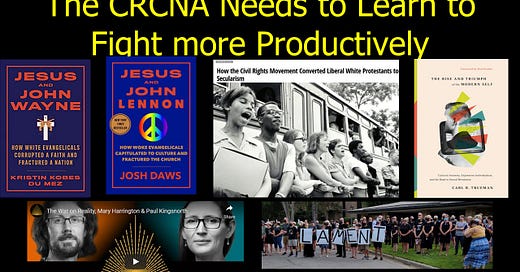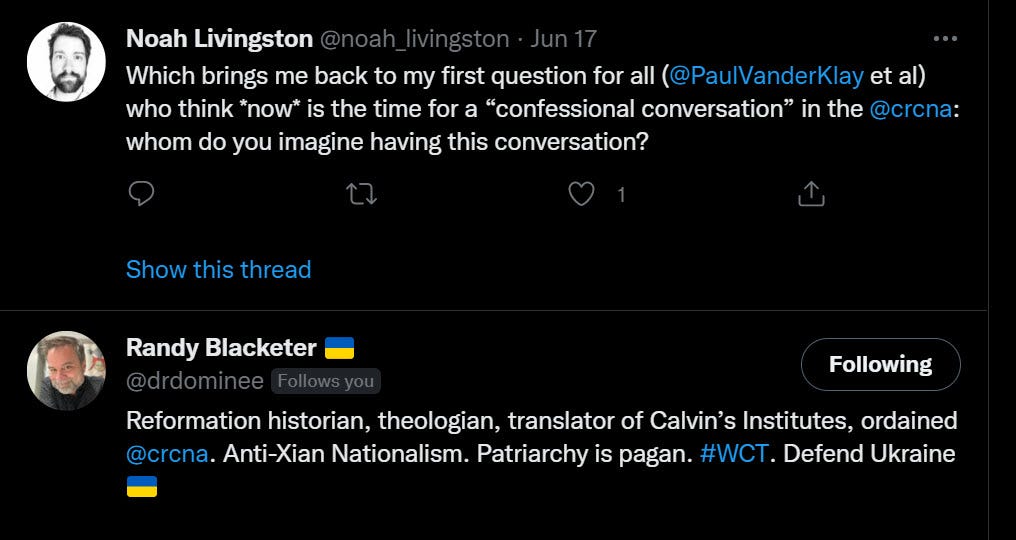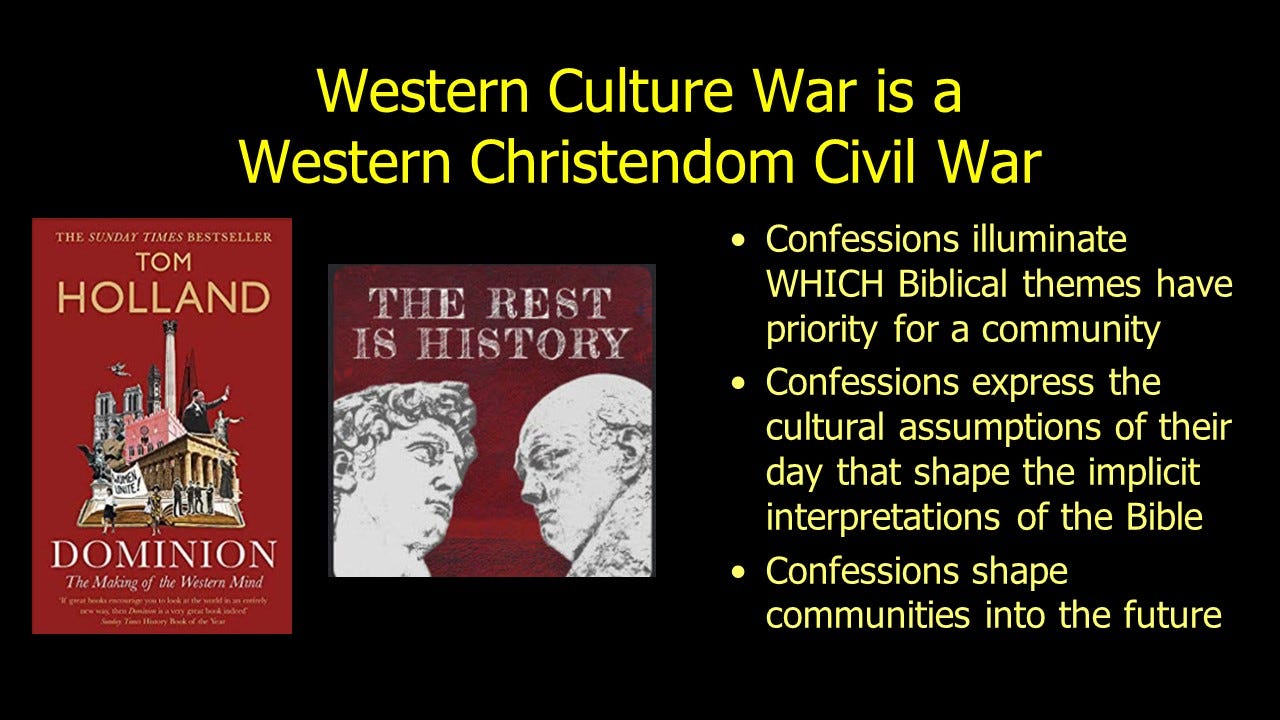The Christian Reformed Church Needs to Learn to Fight More Productively
Like an unhappy couple, the Confessing and Affirming CRCNA Must Clarify Their Assumptions in order to re-arrange their relationship or get a Divorce.
The @CRCNA needs a confessional conversation so the Confessing CRC and the Affirming CRC can understand themselves and each other a bit better.
The first thing to recognize is that the current culture war, of which is forcing the @CRCNA fracture is a Western Christendom civil war.
Few have been as helpful on this topic as @holland_tom both in his book Dominion and in his podcast
Confessions illuminate WHICH Biblical themes have priority in the community. Confessions express the cultural assumptions and contextual concerns of their day that shape implicit interpretive assumptions.
In this posting/thread (video to come hopefully) I'll only highlight one example of this in the @CRCNA current civil war. In this example the question of how does God reveal his will in the world today.
Both sides appeal to the "two books" idea of the Belgic Confession. God reveals his will both through special revelation (the Bible) and general revelation (experience, science, physical world, etc.)
It's the assumed nuance of the reading that separates creates the spectrum the two groups fall upon. This is why we need confessional conversation to tease out the difference within the nuance.
On my channel I've developed the language of upper and lower registers in our engagement with the world. "Upper" is heaven/mind/spirit/eternal. "Lower" is earth/matter/flesh/decaying. This division is NOT simply upper=good lower=evil.
The broader culture is negotiating these registers in many conversations. See @moveincircles Paul Kingsnorth on @WisdomRebel
Right now you can see it in sex as lower register and gender as upper register.
The Confessing @CRCNA says that the God of creation gave you a sexual and sexed body and he expresses his will through the sex of that body. In a fallen world there can be a disconnect but the sex of that body is an expression of his will.
The Affirming @CRCNA repeatedly says that the world should conform to how God made "LGBTQ+" person to be. In other words gender is primary (upper register) and sex is secondary (lower register).
God made the gay person to be same-sex attracted. The transperson is for example a man trapped in a woman's body. The fallen lower register (the M/F sex of the body) should be brought into line with the upper register (gender) or "the true self".
The will of God is expressed in the upper register (gender) and the lower register must be brought into conformity with the upper register. It's the job of the church to "restore the creation" which means realignment. Bruce Jenner was always Kaitlyn ("don't dead-name") because Kaitlyn is her "true self" and in the arc of her lifetime she is now arriving at her eternal self.
For the Confessing @CRCNA the job of the church is to guide, encourage and support putting to death the sinful desires of the flesh. This is shared with RC and Orthodox. Restore the fallen lower register (sex) by bringing gender into alignment with it.
This isn't fully accomplished in this lifetime but one's cruciform self-denial is rewarded in the next life. There are eschatological themes as I expressed in the previous video.
Individuals fall on a spectrum in this debate. Some closer to the affirming camp see SSM as an accommodation rather than an eschatological fulfilment. This gets into the tactical question of prohibitions vs ideals that I've been bringing out.
The Affirming @CRCNA "restoration of creation" can get a bit gnostic. Same-sex marriage is an attempt to model same-sex couples into monogamy complete with child-bearing/rearing. Gender-alignment technology is changing the lower register to fit the upper.
In some Queer doctrine the path to "salvation" is a perpetual journey to discover the secret-sacred-self or "the true self" and all sorts of permutations of the lower register are tried on this this pursuit of "authenticity".
The Confessing CRC and the Affirming CRC ARE reading the same Bible but prioritizing different themes and traditions. Confessional conversations are intended to illuminate the differences and help us evaluate them.
For the Confessing @CRCNA the Bible and the physical world reveal God. Calvin's 3rd use of the law helps us know God's will. It delineate what the sinful desires of the flesh (lower register) are that should be put to death.
For the Affirming @CRCNA God brings justice to the oppressed and the marginalized. This theme has priority. You can hear it constantly fore fronted liturgically and in their arguments on the floor of Synod.
The mis-aligned flesh should through technology and society be brought into conformity with the revealed (inner, upper-register) experience for authentic fulfilment. This is Jesus and John Lennon.
You can find Biblical support for all of these themes but the questions are which themes are given priority and which are allowed to fall into the background. Confessions are supposed to express these priorities.
It would help both sides to clarify their issues, explore their implications and decide whether they can in fact share ecclesiastical and community structures. This is the purpose of confessions. The @CRCNA can have a more productive fight.










Former baptized and professing member of the CRCNA here...
Paul, I see you are framing this in terms of a culture war, but where is Jesus Christ in all this? Is the God Incarnate on the side of an abstract set of sexual norms or on the side of concrete, individual persons?
The division between a "higher" and "lower" register overlooks that individual persons are not one or the other. They are a synthesis of both--and as a synthesis of both, they (as Kierkegaard says) will work out their salvation in fear and trembling. I worry that such an analytic division between higher and lower prevents you from encountering persons in the places and times of their lives.
When a member of the Confessing CRCNA comes to the end of their life and stands before the throne of God, how impressed will the Almighty, the Holy One of Israel, be when he looks down and sees that they spent a good portion of their life denying persons who identified as homosexual standing in the CRCNA? Do we think that the same Jesus who supped with prostitutes and sinners is going to applaud such efforts?
The real culture war is between persons defending abstract propositional truths and persons demanding we pay attention to our fellow human beings.
John 1 describes how the Logos became flesh and tabernacled among us, so I am comfortable inferring that the priorities of the Confessing CRCNA are way out of whack here.
What say you?
It seems like there isn't really such a distinction. In reality both are motivated by feelings, which can be placed in either register depending on if one sees feelings as something belonging to the body or the mind. Or rather if one sees the mind as a part of the body or the body as a part of the mind.
Given our materialistic culture most would probably stuff it all in the lower register.
Affirming sees it as a case of empathy or that the homosexuality feels natural. While the confirming feel that their tradition and order gives a security and that something is lost with changes.
I actually started making a video about this, and my answer to this particular part of the discussion is that it goes back to the internal conflict in the Bible. The conflict between Jesus and Paul. Where the affirming priorities Jesus, while the confirming prioritize Paul.
The conflict can only be solved if that underlying conflict is solved. Which one should have priority?
(of course Jesus isn't always so forgiving and Paul isn't always so demanding. They have both sides, but there is a stronger weight towards one thing for them).